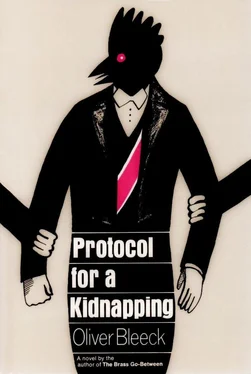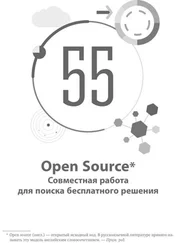“Whose idea was it?” I said again.
He looked at me and then cleared his throat magnificently in true Yugoslav fashion and spat in the gutter. “Washington’s,” he said. “I’m supposed to be a sleeper. You know what a sleeper is?”
I told him that I did and he nodded. “Yeah, I thought that you might. Well, that was twenty-three years ago and I was young then. But I’m older now and since I haven’t heard a word in all that time you might just tell them something for me if you ever get the chance when you’re back in Washington.”
“What?”
“Tell them not to wake me up.” He nodded brusquely, turned, and walked off down the street.
At five o’clock that afternoon I was knocking on the door of Anton Pernik’s apartment under the expectant gaze of one of the plainclothes guards who was far more interested in getting a look at Gordana Panić than he was in me.
He gave her his best smile when she opened the door, but she didn’t smile back. She looked at me for a long moment and said, “Come in, Mr. St. Ives. You’re just in time.”
I followed her into the sitting room. She turned to survey it and then pointed at the large chair where her grandfather had held forth when I’d been there the first time.
“Sit there,” she said, “it’s comfortable. I’ll get us some brandy.”
She disappeared through a door and I looked around the room and it seemed much the same. The pictures of the men with their high collars and their slicked-back hair were still on the walls. The books were still behind the glass doors of their cases.
If anything had changed, it was Gordana. She had on a different dress, a dark red one that was shorter than the one she’d worn previously; but anyone can wear a new dress. Not everyone can wear a new mood that is so pronounced that it manifests a noticeably different personality.
When she came back with the brandy I said, “How is your grandfather?”
She didn’t answer until she served the drinks and was sitting in a straight-backed chair next to mine, the same one she had sat in during my other visit. I had to turn slightly to see her. She looked at me over the rim of her glass. “He’s been detained,” she said.
“Will he be back soon?” I said.
“No,” she said, “not soon.”
“I’ve heard from the kidnappers,” I said.
“Yes,” she said and drained her brandy. Her answer wasn’t quite what I expected.
“They want to exchange Killingsworth tomorrow night. In a place near Sarajevo.”
“I think I would like another brandy,” she said. “Would you care for one?”
“Why not?” I said and watched her move across the room. There seemed to be a difference in the way she walked, but it could have been the shorter dress. Maybe it was the brandy. I looked around the room again and I knew how it had changed. Nothing had been added, but something had been taken away. All the religious artifacts — the crosses, the paintings of Jesus and Mary, a carved ivory representation of the crucifixion, agonizing in its detail, and a number of other religious oils were gone, leaving pale outlines of where they had hung against the darker wallpaper.
When Gordana came back with the brandy, I said, “I see you’ve moved some things around. Are you thinking of taking them with you?”
She looked around the room, sipped her brandy, and nodded vaguely, “I moved them,” she said, adding, “to a more appropriate room.” Once more she looked at me over the rim of her glass. “Are you a religious person, Mr. St. Ives?”
“Not terribly,” I said. “Hardly at all, in fact.”
“Are you an atheist like Tito?”
“I don’t know,” I said.
“But you are not a Catholic?”
“No.”
“If someone asked what your nationality was, what would you say?”
I looked at her. She had finished her second glass of brandy and she was smiling at me. It was a mischievous smile, but the look in her eyes was more than that. It was wicked.
“I’d say. American, I guess. Or United States citizen.
“But you have fifty states. Would you not say New Yorker or California-uh-an? Is that right?”
“That’s right, but I wouldn’t say that. I wouldn’t even say Ohioan, although that’s where I was born.”
“If you asked anyone in this country what they were, they would say Serb or Croat or Slovene or Montenegrin. I think Gospodin Tito is our only true Yugoslav, but then he’s only half Croat. His mother was a Slovene.”
“What would you call yourself?” I said.
“I would call myself Gospodjica Gordana,” she said, rising. She twirled and her red skirt twirled with her, giving me a fine full view of what I was sure were the world’s most beautiful legs. “Citizen Gordana,” she said, holding her glass aloft, “citizen of the world.”
“Nice,” I said, referring to her legs, but indicating the plum brandy.
“Would you like some more?”
“What are we celebrating?” I said.
She put her glass down and grasped the two arms of my chair and leaned forward until her face was close to mine. Very close. A quick glance down assured me that she, too, had joined the no-bra league. I had a hard time deciding where to rest my eyes, but finally decided on her face which was lovely and interesting and, after all, very close to mine. It would have been impolite not to.
“We are celebrating, Gospodin St. Ives, me! ”
Well, there wasn’t anything else to do so I did it. I kissed her. She knew how to do it. Her tongue darted into my mouth, seeking, caressing, a warm, wet determined explorer. I soon found that she wore nothing under her dress and that her skin was as smooth and delightful to touch as it was to look at. Her hands got busy too and then we were naked on the floor and all over each other, feverishly probing, tasting, and demanding from each other. Nobody gave very much; it was all take, and at that particular time and place it was the way we both wanted it and so that’s what we did. And then she gave a half scream, cutting it off by sinking her teeth into my shoulder as her hips arched high and hard into mine and her nails raked my back. She shuddered violently, once, twice, and then she was pounding her body against mine again and gasping, shuddering once again, but less violently, and then subsiding slowly, quietly.
We lay there on the Oriental rugs, thinking our own thoughts. I memorized a pattern in one of the rugs. She ran her fingers down the side of my neck. I propped myself up on my elbows and studied her. There was a warm, sexual glow about Gordana that made her indescribably beautiful, but that’s all. Earlier that day, I had looked at another girl who had that same glow, but who was not nearly so beautiful, not half, who had hair that flopped around over a pert, saucy face and I had felt something, tenderness, affection, care. Something. I found myself feeling only admiration for Gordana, which isn’t a hell of a lot of emotion.
“I am not in love with you,” she said.
“I know.”
“And you are not in love with me.”
“That’s good. That makes it simpler.”
“How?”
“Do you think I am a little girl?”
“No.”
“Amfred did until I taught him otherwise.”
“Are you in love with him?” I said.
“With Amfred? With Ambassador Killingsworth?” She smiled mockingly. “He is married.”
“That’s no answer.”
“He is old.”
“He’s fifty and he’s rich.”
“I like him. He is a foolish man, but I like him.”
“Better than Arso Stepinac who’s not so foolish and not so old and not nearly so rich?”
“Arso,” she said. “He wanted to be engaged, but how could I be engaged to the Church and to him, too? But I agreed. It was to be a secret. He promised.”
Читать дальше












